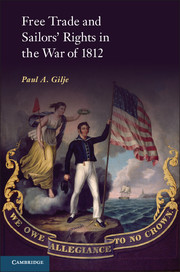14 - Honor
Published online by Cambridge University Press: 05 March 2013
Summary
The notion of honor helped to cement the bond between free trade and sailors’ rights. Honor in the early republic was an important principle in politics and society. Honor combined integrity, self-possession, and bravery. Integrity meant that an individual was honest and sentimental in the eighteenth-century sense of the term – that is, the individual was open about his true self and sentiments. A person's word was sacred and reflected his sincere beliefs. This integrity was central not only to personal relations, but also in relations between nations. Self-possession meant that an individual exerted independent judgment and was in control of himself and his own destiny. Self-possession also reflected the means to sustain one's independence, both socially and economically, without interference from others. Again, this idea had an application to diplomacy, since it meant that a nation should operate on equal terms with other nations without being dictated to. Bravery indicated a willingness to confront one's enemies without flinching, even if it meant facing death. On the personal level this notion of bravery led to the code duelo, whereby on the “field of honor” one was willing to exchange pistol shots – or use other lethal weapons – with an equal who had given one offense (the code allowed other types of action if your traducer was an inferior). Bravery, too, had implications for foreign affairs, since a nation was expected to defend itself against insults with force of arms, if necessary.
Although honor had long been associated with aristocracy, it seemed to have a special meaning in the new democratic world created by the American Revolution. With the egalitarian leveling of society, it became more difficult for political and even military leaders to distinguish themselves from the common herd. Asserting a highly refined sense of honor became a means of doing so. During the Revolutionary War the code duelo swept through the officer corps with such force that the French minister, a true scion of the aristocracy, was shocked by the “rage of dueling” among Americans. After the war, the military continued to be a hotbed of dueling, especially the navy. During the opening decade of the nineteenth century dueling became so common in the navy that it threatened the efficiency of operations. Politicians, too, were prone to fighting duels.
- Type
- Chapter
- Information
- Free Trade and Sailors' Rights in the War of 1812 , pp. 190 - 196Publisher: Cambridge University PressPrint publication year: 2013



